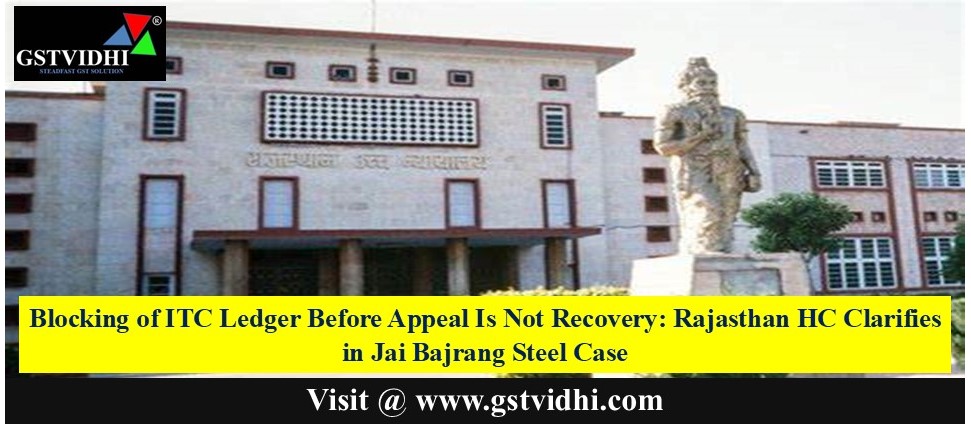
Blocking of ITC Ledger Before Appeal Is Not Recovery: Rajasthan
HC Clarifies in Jai Bajrang Steel Case
Introduction
The legal treatment of
Input Tax Credit (ITC) under the GST regime continues to evolve through
judicial interpretation. A recent ruling by the Rajasthan High Court in M/s
Jai Bajrang Steel vs State of Rajasthan and Others has clarified that blocking
of the electronic credit ledger is not equivalent to recovery, especially
when appeal rights remain unexercised. This judgment provides important
relief to businesses navigating procedural uncertainty after receiving adverse
adjudication orders.
Case
Snapshot
- Case Title:
M/s Jai Bajrang Steel vs State of Rajasthan and Others
- Case No.:
D.B. Civil Writ Petition No. 3174/2025
- Neutral Citation No.:
2025:RJ-JP:15252-DB
- Court:
Rajasthan High Court, Jaipur Bench
Facts of
the Case
The petitioner, M/s
Jai Bajrang Steel, is a partnership firm based in RIICO Industrial Area,
Khushkhera, Alwar. The firm approached the Rajasthan High Court challenging the
blocking of its electronic credit ledger (ITC ledger).
Sequence of Events
- An adjudication order was
passed on 30 August 2024, later rectified on 28 November 2024.
- Before the petitioner could file an
appeal, the tax department blocked the
ITC ledger without any prior notice or opportunity of hearing.
- The action was taken by the Deputy
Commissioner, State Tax, Bhiwadi, presumably in anticipation of
recovery of dues under the adjudicated order.
- The petitioner argued that the action
was premature and unlawful, especially in light of Section 78 of
the RGST/CGST Act, which mandates a 3-month waiting period before
initiating recovery.
Petitioner’s
Submissions
Represented by Mr. Tanmay
Dhand and Mr. Niraj Kumar Yadav, the petitioner made the following key
arguments:
1. Premature Blocking of
Credit Ledger
- The department had blocked the Input
Tax Credit ledger without waiting for the appeal period to lapse.
- Such blocking, the petitioner argued,
violates Section 78 of the CGST Act which prohibits recovery within
three months from the date of service of order.
2. Violation of Natural
Justice
- The action was taken without any
show cause notice or opportunity of hearing, violating the principles
of natural justice.
3. Blocking is De Facto
Recovery
- Although the department might claim
that blocking is not recovery, in effect, it prevents the use of
legitimately accumulated credit, making it akin to recovery.
4. Hindrance to Business
- The blocking of credit has crippled
day-to-day operations of the petitioner, which depends heavily on
input tax credit for cash flow and working capital.
Respondent’s
Contentions
The State, through its
representative Mr. Kartikeya Sharma, submitted that:
- The petitioner had not paid the
adjudicated demand, nor had it filed any appeal till date.
- The blocking of ITC is a
preventive measure, not recovery.
- The authorities acted in accordance
with their powers under Rule 86A of the CGST Rules, which allows
temporary blocking of credit ledger in certain situations.
Key Legal
Provisions Involved
Section 107 – Appeals
under GST
- Taxpayers can file an appeal against
any decision or order within 3 months from the date of communication
of such order.
Section 78 – Time for
Initiating Recovery
"Any amount payable
by a taxable person in pursuance of an order passed under this Act shall be
payable within a period of three months from the date of service of such
order..."
Rule 86A – Blocking of
Credit
- Allows provisional restriction
on credit if it is believed to be fraudulently availed or
ineligible.
Observations
by the Court
The Bench comprising
Chief Justice Manindra Mohan Shrivastava and Justice Anand Sharma carefully
examined the statutory provisions and the facts on record.
1. Appeal Not Yet Filed
- The Court noted that the petitioner
had not discharged the tax liability nor filed an appeal at the
time of filing the writ.
2. Blocking Not
Equivalent to Recovery
- The judges emphasized that blocking
of ITC ledger does not amount to recovery as per Section 78.
“Blocking of ledger of
ITC per se does not amount to recovery.”
3. Appeal is an Available
Remedy
- The petitioner still has an available
remedy in the form of an appeal under Section 107.
4. Instructions to File
Appeal and Represent
- The Court held that the petitioner
should first file an appeal and then make a representation to
the authorities for unblocking the ITC.
“On such representation
being made along with proof of filing of appeal, the authority shall examine
whether appropriate orders are required to be passed…”
Final
Verdict
- The writ petition was disposed of
with liberty to the petitioner to:
- File an appeal,
and
- Make a representation to the
department for unblocking of ITC ledger.
- The Court allowed revival of the
petition in case of further grievance.
“Writ petition is
accordingly disposed off with liberty to the petitioner to revive the petition
in case eventuality so arises.”
Conclusion:
Due Process Must Prevail Over Administrative Overreach
This decision by the
Rajasthan High Court reiterates a foundational principle of tax jurisprudence: legal
remedies must not be undermined by administrative haste.
While GST authorities are
within their rights to protect revenue, they must act within the framework of
the law. Blocking ITC prior to appeal—without hearing the assessee—is not only
procedurally improper but also affects the working capital cycle of genuine
businesses.
The High Court has struck
a balanced approach, directing taxpayers to exhaust available remedies
and empowering the tax department to act only after procedural compliance.
Disclaimer: All the Information is based on the notification, circular and order issued by the Govt. authority and judgement delivered by the court or the authority information is strictly for educational purposes and on the basis of our best understanding of laws & not binding on anyone.
Find the Attachment (Press on Click Here )
Click here